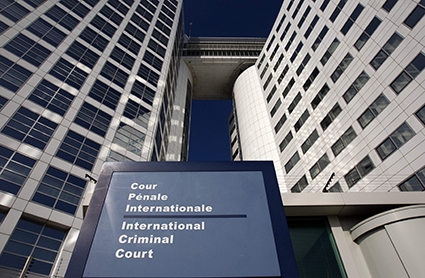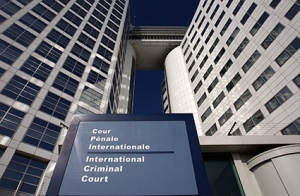When the Little Guy Surrenders to International Law
The August 2008 war ended in five days but seven years later there still is no full stop to the confrontation. Many international and local commissions were created to investigate; different types of conclusions were made. Heidi Tagliavini’s fact-finding commission’s report alone had 1150 pages. The conclusion of the Parliamentary Commission of Official Tbilisi had 1500 pages, not to say anything about the 98-volume Case of the August War in the Georgian Prosecutor’s Office. Recently, the International Law Prosecutor of the Hague International Criminal Court (ICC), Fatou Bensouda, appealed for the court to start a new investigation into the August War. Whether the judges will satisfy her appeal will be seen in a few days. Before that, the main prosecutor of the ICC will arrive in Tbilisi.
In particular, Bensouda is demanding investigation of two episodes of the 2008 Russia-Georgia war – one of them might speak of a possible crime commited by the Georgian armed forces. According to the prosecutor, during the Russia-Georgia war, the so-called South Ossetian and Georgian armed forces committed a military crime which involved attacking peacekeeping mission representatives and their sites. The second episode concerns the alleged ethnic cleansing of Georgians from the Liakhvi Gorge and the fate of 18,500 Internally Displaced Persons (IDPs). According to Prosecutor Bensouda, there is proof that, although it was carried out by Ossetian units, the crime was committed with the “possible participation of Russian armed forces”. Before Prosecutor Bensouda’s appeal is approved or dismissed, in Tbilisi people have started speaking about the ‘trap’ of the Hague. Georgian press printed opinions that, by initiating the process, Bensouda will finally fulfill the dream of the Kremlin and billionaire Bidzina Ivanishvili to imprison ex-President of Georgia, Mikheil Saakashvili. The GHN agency writes in an analytical article that “when Russian diplomats and lawyers present evidence to the court on how the Georgian troops bombed the so-called ‘sleeping Tskhinvali’ by salvo fire machines, how the Georgian tanks fired at the base of the so-called ‘Russian peacekeepers’ (where several provocateurs died that were only formally named ‘peacekeepers’), Prosecutor Bensouda will consider this as an international crime, for which the general who gave the order to bomb Tskhinvali from the salvo fire machines and the supreme chief who ordered the army to start military actions should be held responsible.”
Indeed, all roads of the first appeal of Prosecutor Bensouda lead to Mikheil Saakashvili. Nevertheless, it will be hard to prove and it will be hard to raise charges. In Tbilisi, at the President’s Palace, there no doubt sits a document signed by Saakashvili, based on which the Georgian armed forces began to act. It is highly unlikely that said document mentions an attack on the so-called Russian peacekeeper’s base located in Tskhinvali. Therefore, Prosecutor Bensouda’s target will most probably be the Georgian general who made corrections to the artillery fire in August 2008. It should be mentioned right away that the fact of Prosecutor Bensouda’s appeal is no less dangerous than laying charges against ex-President Saakashvili. In particular, the Kremlin and the Georgian Dream government might be happy about the trial of Saakashvili but the case does not concern Saakashvili alone – when extradition of Georgian soldiers, officers and generals is demanded in order to investigate the crime that they allegedly committed – it might become a reason for the state’s destruction and an outbreak of civil war.
Unlike Georgian media, the current Governor of Odessa and ex-President of Georgia Mikheil Saakashvili welcomes the initiative of Prosecutor Bensouda and calls for Prime Minister Garibashvili’s cabinet to cooperate as much as possible with the Hague. “…I welcome the decision of the International Law Prosecutor’s Office to start investigating military crimes committed during the August 2008 War on the territory of Georgia. Our government appealed to the Prosecutor’s Office back in August 2008, providing them with information about rough violations of international law norms, including crimes against humanity (ethnic cleansing) and war crimes. Unfortunately, Russia does not recognize international criminal law and during all this time it had been trying to use the procedures for its own political goals. It is important that the Georgian side provides all available information to the Prosecutor’s Office, including information about ethnic cleansing,” Saakashvili’s statement posted on his official Facebook page reads.
The Hague ICC is an international legal structure which was established during the Rome Statute and since 2002 i.e. from the enacting of the Statute the court’s jurisdiction, investigates genocide, military crime and crimes against humanity. The Statute is signed and ratified by 123 states, including Georgia. While all countries of the European Union have ratified the Statute, Russia has not and nor has the United States.
Therefore, if proving the blame for ethnic cleansing, it is hard to imagine any of the Russian generals being tried at the Hague court, unlike Georgians. Of course, it raises the feeling of a large legalized injustice, but what can we do? This is how international law and the fate of a small country goes. If you cooperate with the international tribunal, it might be bad for you, but if you do not – it might be worse!
Zaza Jgharkava












